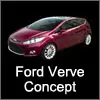
While the body looks slightly more refined and stylized, the overall concept has little change. Perhaps the downsizing of the headlamps and cab tweaks are the predominant elements of this redesign, which attempts to show a more elegant version of the Mustang GT.
The classic American redesigned by Fabrizio Giugiaro is wider and its cab extends to the end of the rear sector. These changes suggest a less static image. Differences in the front however, make the car lose characteristic features so well achieved in the Ford restyling.
An interesting element is the panoramic glass roof, very fashionable in Europe, which gives the cabin slender. As a conclusion on the redesign it can be said that it is not very enriching. The most characteristic features of the car were diluted in minor modifications. There are also no traces or at least daring innovations that stand out as possible differentiating factors.

Clearly, the body lines have no relation to the rest of the cars Ford offers in the United States. What is a direct influence for Giugiaro, of the Ford of that country, is the Mustang FR500C, an edition of 25 units destined for competition that was specially offered. It was characterized by weighing 200 kilograms less than the standard car and delivering 100 more horses, reaching a power of 500 hp.
And it turns out that the Mustang Giugiaro Concept also uses special competition components. Its 4.600 cm3 V8 engine features aggregates such as turbocharger, a larger intake manifold and a new Ford Racing special division exhaust system.
Also noteworthy is the addition of the Ford GTelectronic injection system. Thus the concept presented by Giugiaro also reaches 500 horsepower.
© Adrián Blanco 2007 - No full or partial reproduction of text and/or images without explicit written consent of the author. —
 Volkswagen Up! Concept
Volkswagen Up! Concept Mercedes Benz F700 Concept Rinspeed Zazen Honda CR-Z Concept Dodge ZEO Concept Nissan Forum Concept Rinspeed SQUBA Concept Ford Explorer America Concept Cadillac Provoq Concept Mazda Furai Concept
Mercedes Benz F700 Concept Rinspeed Zazen Honda CR-Z Concept Dodge ZEO Concept Nissan Forum Concept Rinspeed SQUBA Concept Ford Explorer America Concept Cadillac Provoq Concept Mazda Furai Concept